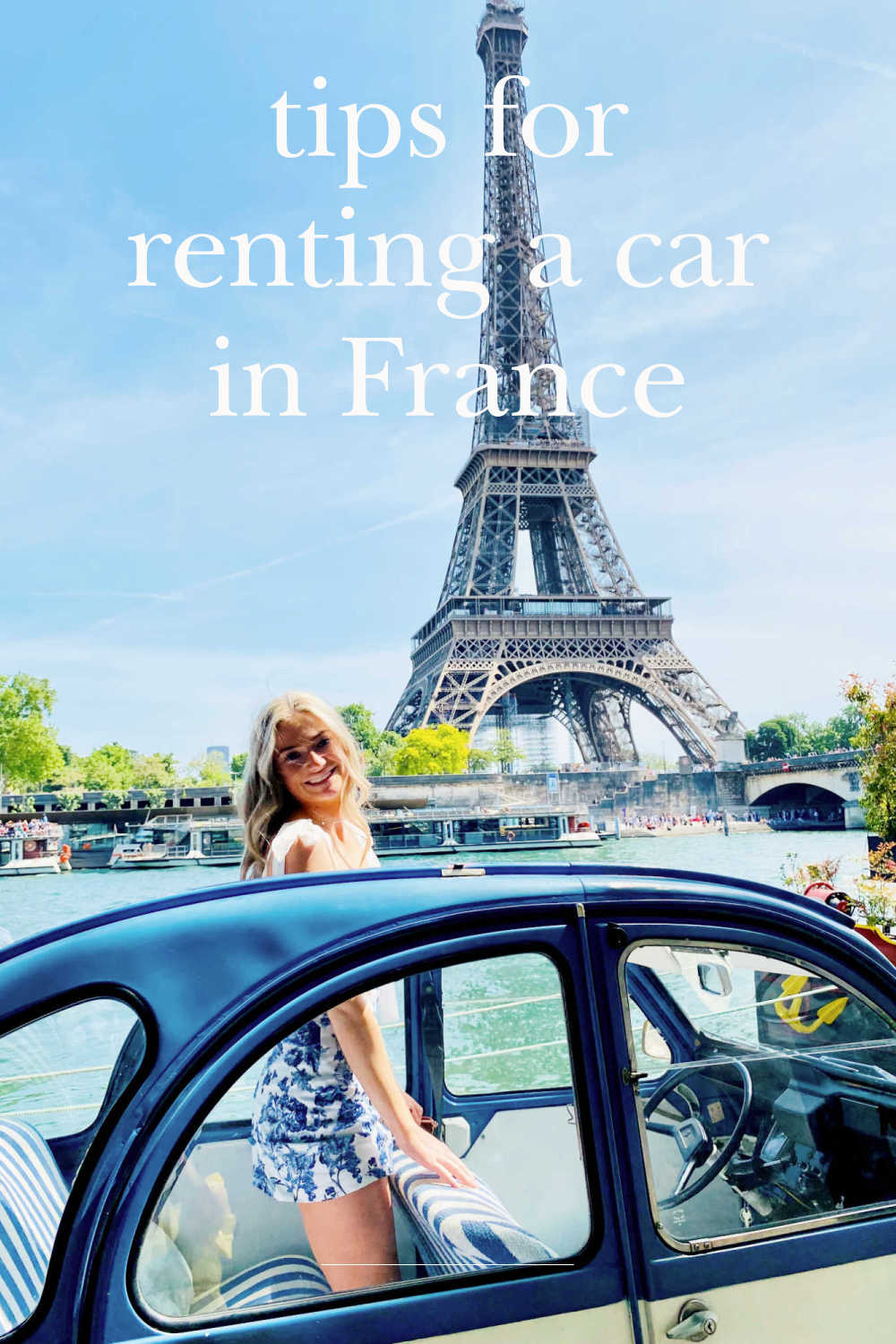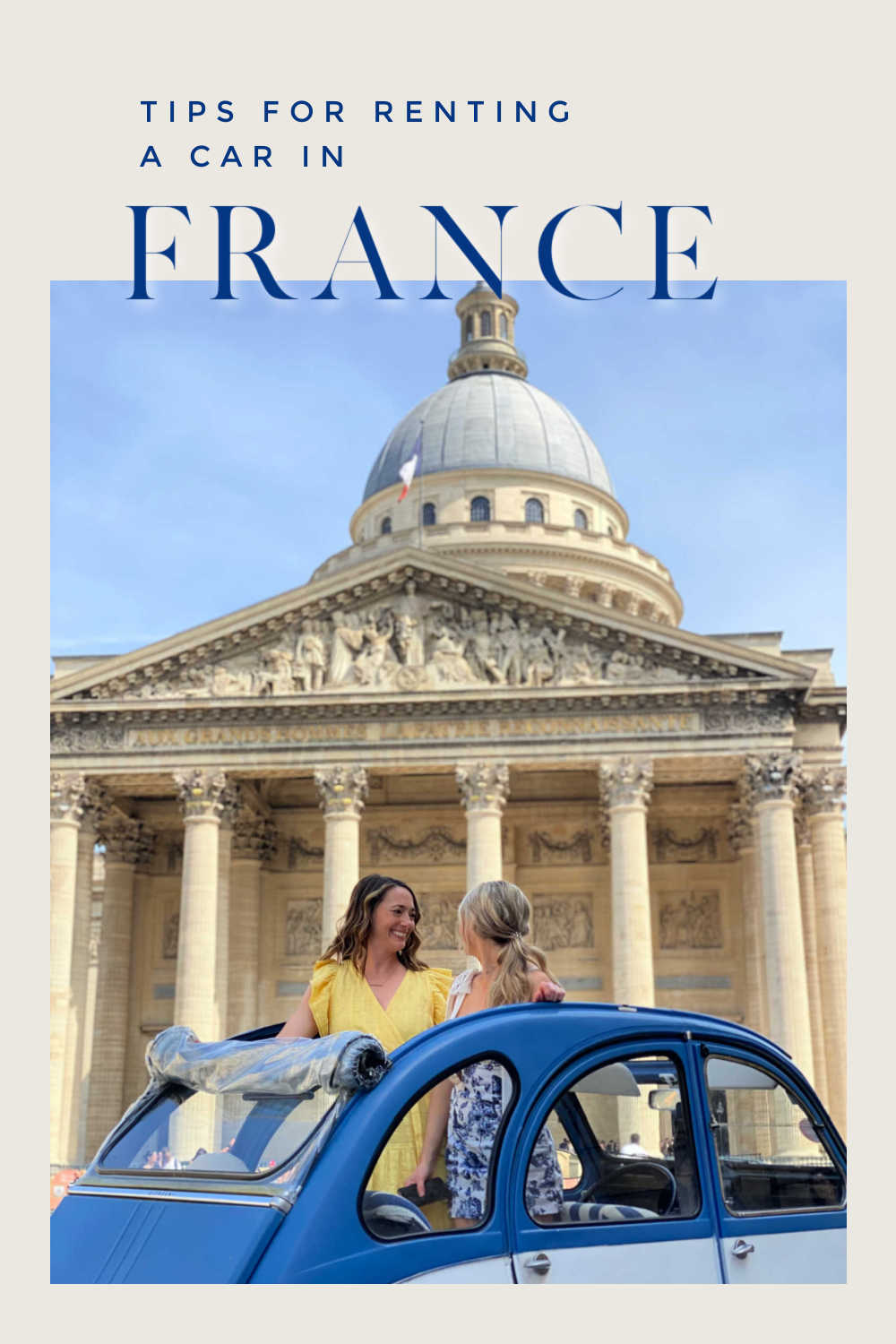rachelteodoro
Tips for Renting a Car in France
When I started researching things to do in Paris on a recent mother/daughter trip, the list of things we wanted to do extended beyond the city. So I started looking at our transportation options. There are quite a bit of options for public transportation, but in order for you to have the most flexibility in your schedule and to not be at the mercy of a train schedule, renting a car will give you the freedom to get around. You can visit smaller towns and make countryside stops or detours to markets and wineries you might have otherwise passed by. Renting a car in France can create some unforgettable memories and here are some tips to know before you go!
Tips for Renting a Car in France
*All of the fun car images were actually taken on a tour with La Petite Frenchie in Paris. We were happily tucked away in the backseat and let Fredrick do the driving. Our car rental adventure started after we took the train out of Paris to Mantes le Jolie train station. It's All the Same
I was asked MANY times if they drive on the opposite side of the road in France or if the steering wheel is on the right rather than the left. They do not and it is not. I am fairly certain I would not have been renting a car if they did! Driving the highways and even on some of the backroads weren't much different than driving around home. I found that it was rather easy to get around and I'd definitely rent a car again if I was in the area.
Book Early
If you are very American, like I am, your stick shift driving skills aren't that great. Book early for not only the best rates but also for those limited automatic cars that are a rarity.
Smaller is Better
Getting upgraded to a larger car isn't always better in France. Gas is more expensive and larger cars usually use more gas. Streets are often narrow and parking can be tight, so if you can, stick to something smaller, and if they want to upgrade you to something larger, take a peek at it first to see if you'd be comfortable navigating narrow roads with it.
Do You Really Need an International Drivers Permit?
You'll probably never be asked for your international driver's permit, but it's an inexpensive document that could be useful to have. On the off chance that you are stopped by a police officer, you will be grateful that you got one. They are easy to obtain at your local AAA office. And no, you don't need to be a AAA member. Bring in an extra passport photo they will staple to the back and it costs only $20 and you'll have your permit in hand in minutes. Your permit lasts for a year and doesn't replace your driver's license. You'll need a driver's license and probably your passport when you check-in at the car rental agency.
Have a Plan
Map out your drive ahead of time, {or use the handy road trip itinerary I've created} to help you plan your trip. I plotted points in google maps and made note of how long it would take to get to each location. I wanted to limit my driving each day, but hit the highlights along the way. This meant sometimes taking the back country roads to see smaller towns rather than the highway. I also made sure I added a few bonus stops just in case we had extra time.
Familiarize Yourself with the Road Signs
This is something I wish I had done, but I didn't. I figured how different could they be. They can be quite different and kind of confusing, so just take a peek at this Wikipedia page and get familiar with them.
Tolls
There are tolls and they can be expensive {often between 2-7 euros, multiple times on your route}. If the road starts with an A {or autoroute}, you can almost be sure that there is a toll along the way. You can plan your route around tolls, but it will often add an hour or more to your driving route and it was worth paying a few euros to get through. You can pay cash or with a credit card. Make sure either/both are easily accessible because the tolls often sneak up on you and it's easy to zip in and zip out quickly if you are prepared.
Cameras
I don't think I saw a single police officer our whole road trip, but I did manage to get two camera tickets for speeding. The speed limit often goes up and down very quickly and that seems to be where they get you. You'll have to pay a fee to the rental car agency {since it takes them somewhere around 20 euros for "processing" {giving them your address} each ticket} and a fee to the transportation department after you receive your fine in the mail. I got notice that I received two infractions from the rental car agency and was charged twice for the processing fee, but I haven't seen the tickets yet, so I'll keep you posted.
Update: I received two traffic tickets in the mail from the Republic of France. They were all in French. You get charged more for speeding infractions the more over the limit you are going. One ticket I was fined for 11 km/h over, the other was 7 km/h over. Both tickets were received within 20 minutes on our route outside of Caen. So drive carefully!
Get GPS
Pay the extra fee and get GPS. I'm not the best at map reading and I valued having directions and a map to help me navigate. We also downloaded Google maps for the area we were visiting so I could access them offline. These were often helpful so I could double and triple-check our location!
*Pro-tip: Ask the rental car agency to set the GPS to English before you leave the office. They will often know how to do it much more quickly than you will be able to figure it out and you can be on your way!
Insurance
In the states, we always decline the extra insurance, internationally, NEVER decline it. Your American car insurance policy will not cover your rental car in France.
We learned this in Italy when we declined the coverage and then proceeded to drive the Amalfi Coast. I think my husband still has nightmares about it!
Gas
In the states, I've always picked up a car with a full tank of gas. The previous renters did me dirty and I started up the car with the gas light on. There are limited gas stations {not every car rental lot has a pump nearby}, so on fumes, I chugged to the closest station about 15 miles away.
The rules are still the same, leave it with the same amount you rented it with, so I left it empty when I returned.
Gas stations are often hard to find. I realized as I drove that I'd see a sign for a petrol station and then another that said the next one was 40 km away. So if you think you might need gas, fill up when you can, otherwise, you might be stranded in the countryside!
Kilometers Vs Miles
Because I have run a few 5k's in my lifetime, I did a lot of quick calculations knowing that a 5k is 3.1 miles. I normally travel with my nerdy engineer husband who usually happily does the math for me, but since I was on my own, I figured it out in my own way. Just having a basic understanding will help you navigate.Closing Time
Make a note of the office hours. Most car rental agencies are closed from 12-2 for lunch and many have limited hours on the weekends.
Pick Up and Drop Off
You can pick up and drop off your car rental in different locations. This will often cost you more. But it may be the best way for you to start or finish your trip, so know that it's an option.
Video Before You Go
After hearing stories {albiet rare}, I have taken to shooting a quick video of the outside of the car when I return it to the lot. Having the video is your proof that no damage occurred while you rented the car. This can be helpful when there is a language barrier and thousands of miles of separation.
I sure hope these tips help give you the confidence to rent a car in France and explore those open roads. You'll open yourself up to the most beautiful countryside and you'll be creating some of the best memories! Now you're ready to tackle France by car! Bonjour! disclaimer: this post may have affiliate links. By clicking on them and purchasing through them, I may receive a small commission. These small purchases help me to continue to keep writing content and creating at Rachel Teodoro. Thank you!
disclaimer: this post may have affiliate links. By clicking on them and purchasing through them, I may receive a small commission. These small purchases help me to continue to keep writing content and creating at Rachel Teodoro. Thank you!
loading..












No comments
Post a Comment